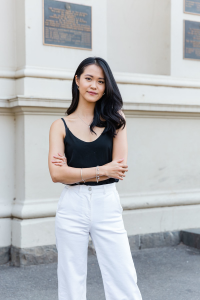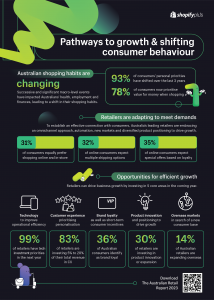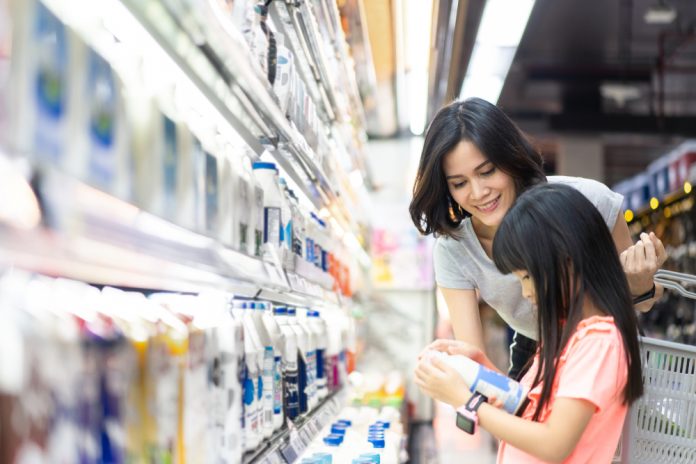Seventy-eight per cent of consumers are prioritising value for money when shopping, as Australians are almost twice as likely to be stressed about higher prices of groceries and essentials than they are about the cost of housing, new research from Shopify has revealed.
The Shopify Australian Retail Report, conducted in partnership with YouGov, unpacks how Australian consumers’ priorities, financial stressors, and purchase behaviours have evolved amidst the current economic conditions. The study of more than 1000 Australian consumers sheds light on these shifting consumer behaviours and lays out effective pathways to growth for retailers to connect with customers facing economic pressures.

“We’ve seen an onslaught of successive macro-level events impact so much of our lives – from the obvious prioritisation of health post-pandemic, to the fact that millions of Australian homeowners have faced not only their first but their 12th interest rate rise in the past year. It would be remiss to expect consumer priorities and behaviours to remain unchanged from 2019 or before,” says Shopify Director of Technology Services & Enterprise, APAC James Johnson. “But what we’re seeing is that while, across the board, Australians share some common priorities and challenges, when you dive deeper into the data you find that there are clusters of customers where these diverge.”
The report revealed six new consumer personas which represent these clusters, grouped by a number of behavioural factors, and analysed each cohort’s financial stressors and outlook, purchase intentions, major life priorities, and shopping expectations. These six personas are:
- The Value Valuer – they define value as ‘quality that lasts’, and prioritises product quality over brand. Least likely to be influenced by a celebrity or social media, this is the largest group, representing 32% of all consumers surveyed.
- The Loyal Local – they also value quality over brand and price, and are likely to switch brands to support local or more sustainable businesses. The most likely to switch to public transport to save money, this is the second largest group, representing 24% of Australians.
- The Savings Seeker – they are the most stressed consumers overall, and are the most price-sensitive of all groupings. By far the most likely to switch to private label brands, this persona represents some 22% of consumers.
- The Mindful Moneybags – the wealthiest and most environmentally conscious cohort, these shoppers have not felt enough of an impact to change their shopping habits and up 10% of Australian consumers.
- The Picky Purchaser – the second highest-earning shoppers, this cohort has the highest expectations when it comes to the shopping experience. They are the most brand-loyal by a considerable margin, and comprise 8% of Australians.
- The Social Shopper – the most likely to shop online and the most influenced by influencers, this cohort is named after its members’ penchant for digital interaction. They prioritise speed in the purchase experience, but are the least demanding overall and make up just three per cent of consumers.
All personas listed above said the main expense they were cutting back on was dining out, apart from The Mindful Moneybags, whose primary cost-cutting measure was postponing holidays.
In addition, the majority (57%) of Australian consumers are optimistic about their personal situations but there is a split on the economy as a whole, with 48% optimistic and 45% pessimistic. Mindful Moneybags were the most likely to be optimistic about their personal situations (74%), while Picky Purchasers were most optimistic about the economy (76%). On the flipside, Savings Seekers were most pessimistic about their personal situations (49%) and the economy at large (58%).
“Customers are being a little more reserved with their spending, and not as impulsive as they were in previous years. But while people are willing to change brands for cheaper items, many aren’t prepared to sacrifice customer experience,” says LSKD E-Commerce Manager James Reu. “For us that means doubling down in our relationship and community building, and making them feel like they’re part of something bigger. It’s about making sure we’re making the customer feel heard and creating a memorable experience.”

“More and more we’re seeing customers prioritise quality and value for money over a bargain. As a brand that means starting with great products and great promises which you then follow through on. In the current environment you’re fighting a lot harder to get that dollar and you can’t get away with bad products. At July, we offer a lifetime warranty on everything in our range so customers can shop with confidence knowing they’re getting something that will last the long-haul,” says July Global General Manager Zhoe Low.
Highlights from the report:
Financial and personal priorities
- 93% of Australians say their priorities have changed over the past three years, with health the top priority for 63% of Australians and all personas.
- Following health, five of the six cohorts cited ‘spending time with family and friends’ as the second-biggest priority, aside from Mindful Moneybags who prioritised ‘improving my personal situation’.
- 56% of Australians are spending more time at home, with 33% of Australians saying that was ‘a lot more’. Picky Purchasers (45%) were most likely to be spending ‘a lot more’ time at home, whereas 11% of Social Shoppers (11%) were home ‘a lot less’.
- 40% of Australians are stressed about the cost of groceries and essentials, with Savings Seekers (54%) and Mindful Moneybags (25%) the most and least stressed, respectively.
- 22% of Australians are stressed about higher mortgage or rental payments, with Value Valuers (24%) and Social Shoppers (18%) bookending the group.
Shopping habits
- 75% of Australians are cutting down on something to spend money, with 42% dining out less, 33% choosing cheaper options when buying discretionary items, and 27% opting for private label brands.
- While 38% of Australians prefer shopping in store, the margin is thin as 31% prefer online and another 31% on the fence. Savings Seekers (48%) were the most likely to prefer in-store shopping, whilst 52% of Social Shoppers preferred shopping online.
- When shopping online, Australians expect retailers to accept debit & credit cards (46%), special offers and discounts based on loyalty (35%), and multiple shipping options (32%).
- Only six per cent of Australians expected stores to accept crypto, however Mindful Moneybags expected it twice as much as the average Australian (12%).
- When shopping in-store, Australians expected knowledgeable staff (57%), enough stock of the item they want (56%), and attentive service (49%). This was largely consistent for all personas, however the number one expectation of Picky Purchasers was in-store perks like a cafe or smoothie station.
Brand connections
- Just over a third (36%) of Australians identify as brand loyal, with Picky Purchasers the only cohort where a majority (57%) identified as such.
- Australians typically spurned their usual brands due to finding a better price or discount (49%), except Mindful Moneybags whose main reason to shop elsewhere was convenience.
- To win their loyalty, the majority of Australians (53%) want consistently low prices and promotions, with offering high quality goods (50%) and loyalty points (48%) rounding out the top three.
- 61% of Australians discover new products via Word of Mouth, however Twitter was the number one choice for Mindful Moneybags (20%), while YouTube was the top discovery channel for Local Loyals (30%) and Picky Purchasers (20%).
For more information on the report, visit shopify.com/au/plus/guides/australian-retail-report.






